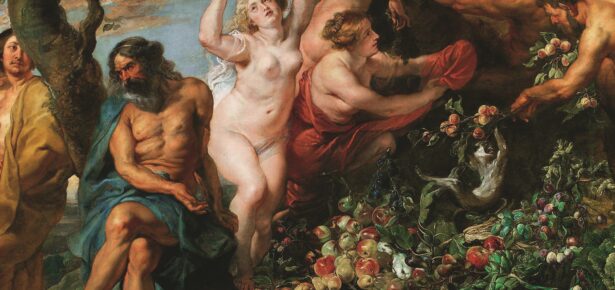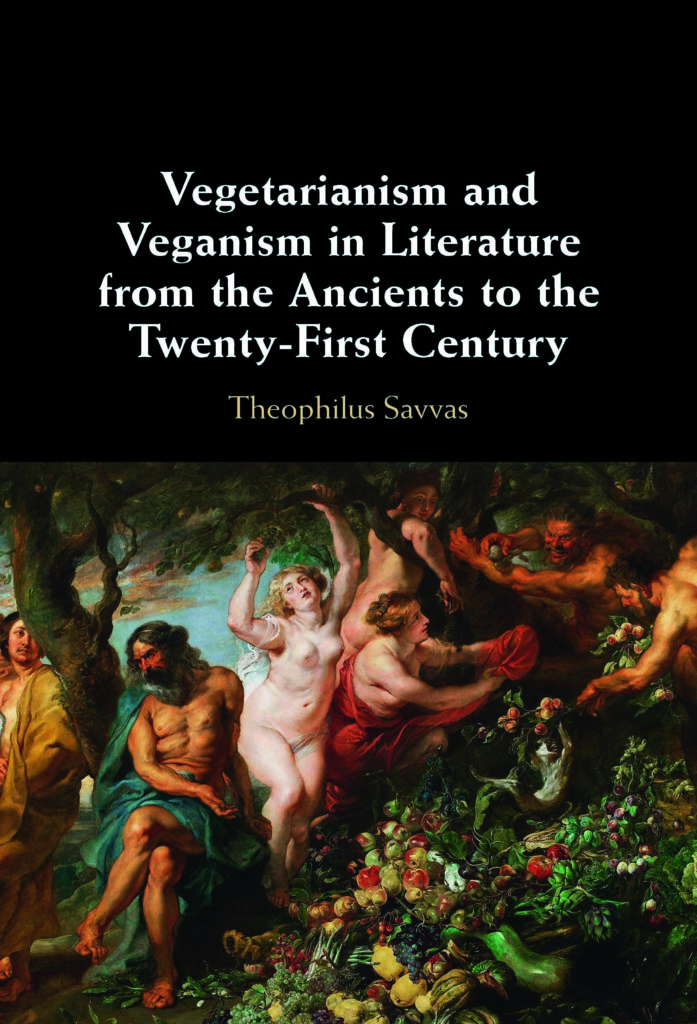
‘Diet’ is derived from the Greek diaita, meaning ‘way of life’, so that what we eat is intimately connected with who we perceive ourselves to be. Historically, those who chose to abstain from the eating of animal flesh were outsiders, frequently viewed with suspicion; today, vegetarianism and veganism are part of identity politics. There is wider significance too: reducing our consumption of animal products is now considered one of the most important factors in the debate about sustainability, climate change, and the Anthropocene.
The topic features in the work of major ancient writers, including Plutarch (‘On the Eating of Flesh’) and Porphyry (‘On Abstinence from Animal Food’); but it is Pythagoras who is most associated with it. His connection with the phenomenon was such that those who abstained from the consumption of meat were frequently labelled ‘Pythagoreans’ until the coining of the word ‘vegetarian’ in the mid-nineteenth century. The transmigration of souls offered the major reason for avoiding the consumption of animals for Pythagoras—you might be eating a departed relative re-birthed in animal form—but there is also an ethical component to his argument as humans and animals are drawn into the same kinship group: humans, he thought, should not eat those creatures that had loyally helped them with the daily chores.
Aristotle had a very different view: he emphasised a ‘natural’ hierarchy, in which animals were made entirely for human usage, and it was this view which generally prevailed. The Bible speaks of mankind having ‘dominion […] over every living thing that moveth upon the earth’; that is ambiguous, but it was taken by many, including theologians such as Aquinas and Augustine, to legitimise an Aristotelian view of mankind’s relationship with animals. This helped ensure that ethical vegetarianism remained a marginalised practice in the west until the nineteenth century. In the east, the story is a little different—there is indeed some speculation that Pythagoras’ practice was influenced by his own eastern travels—where Hinduism, Jainism and Buddhism tended to advocate a greater reverence for animal life (although only Jainism actually mandates anything approaching veganism). The cross-pollination of ideas was important, and we should guard against seeing it as a one-way process of cultural transmission from east to west.
In the sense that vegetarianism circulated through creative writing, it can be seen as a literary phenomenon. There is, for instance, debate about the extent of the historical Pythagoras’ vegetarianism (and limited extant evidence for it), but there is significant cultural importance in the literary representation of him as such, most notably in Ovid’s great poem Metamorphoses. During the early modern period, when humanity’s behaviour towards animals was generally most cruel, the idea of vegetarianism was kept alive through its association with the related literature of utopianism and pastoralism. Indeed, this strong connection goes back to the ancient idea of the Golden Age, via the Biblical notion of Eden—John Milton, for instance, offers a vegetarian version of prelapsarianism in Paradise Lost (1667)—and it is found in Thomas More’s foundational Utopia (1516), and later in key Victorian novels of the utopian genre, such as Edward Bulwer-Lytton’s The Coming Race (1869) Samuel Butler’s Erewhon (1872).
The philosophy of vegetarianism is key to Shelleyan romanticism too. Percy Bysshe Shelley advocated what he called the ‘natural diet’ in several essays and it features in his utopic poem ‘Queen Mab’ (1813), the extensive notes to which reveal that the idea was central to both his ethics and his poetics. In Mary Shelley’s Frankenstein (1818), the creature initially idolises humanity, but is then revolted by it, recognising that the behaviour of the species does not match the perfection of the form; humanity is rejected via an avoidance of the violence of human eating habits: ‘My food is not that of man; I do not destroy the lamb and the kid to glut my appetite; acorns and berries afford me sufficient nourishment’. The importance of this declaration lies in the fact that it provides both the conduit for the creature’s critique of humanity and the substance of his own promise to be a better version of the human. Here a distinction is established, then, between the monstrously human Victor Frankenstein and the humane monster.
In America, Transcendentalism, deeply influenced by romanticism, was also engaged in such considerations. While British romantic vegetarian thought was generally ethically-focused, in the United States, the idea was more often than not couched in terms of its supposed health benefits to the human (although these health benefits did often also bring with them the sense of moral improvement too—as with temperance). However, the leading vegetarian advocate in the United States, Amos Bronson Alcott, was sympathetic to the animal welfare cause and made abstention from the ‘fruits of oppression and blood’ central to his belief system. The very first usage of the word ‘vegetarian’ seems likely to have been at Alcott House, a school started at Ham Common, London, in 1838 by James Pierrepoint Greaves and named after Bronson; during the early 1840s several uses of the word appear in the House journal, The Healthian. Alcott would later go on to establish his own vegetarian commune, Fruitlands, back in the United States.
By the end of the nineteenth century, influential works by Howard Williams, Henry Salt, Edward Carpenter, and the Theosophists Anna Kingsford and Annie Besant, had established vegetarianism in London as a ‘new cult’ in the words of the young Gandhi, who arrived in the capital in 1888. This intellectual atmosphere was accompanied by a perhaps surprising amount of eating opportunities in the capital—34 vegetarian restaurants are listed as being open in 1889. By 1895, the cause was prominent enough for Oscar Wilde to have Algernon quip about it in The Importance of Being Earnest: ‘You can’t possibly ask me to go without having some dinner’, he protests, ‘It’s absurd. I never go without my dinner. No one ever does, except vegetarians and people like that.’
Vegetarianism is axiomatically connected with animal rights; but it has also frequently been linked to the rights of marginalised humans too. Alcott, for instance, was a ‘universal reformer’, and so vegetarianism was linked to abolitionism in the States, and in Britain, Carpenter advocated vegetarianism as part of a ‘larger socialism’ which would champion not just the working classes, but those whom Carpenter described as ‘Uranian’ (today’s approximation would be ‘queer’). The connection is established through the way in which humans have been strategically ‘degraded’ as animals and thus abused through a variety of servitudes by those more powerful. Eliminate the assumption of natural hierarchy, the argument goes, and the basis for the metaphorical degradation is eliminated too. This rationale has featured most strongly in a branch of feminist thought, and writers such as Charlotte Perkins Gilman, whose utopian novel Herland (1915) presents a meatless and menless society, and Carol J. Adams, in her The Sexual Politics of Meat (1990), have allied vegetarianism with a rejection of patriarchy.
Veganism begins with the expansion of vegetarian dietary discourse to include a prohibition on all animal-derived foods and drinks, but goes further, rejecting the human use of animal products more generally. The term was coined during World War II, but its cultural prominence is a twenty-first century phenomenon (perhaps due to greater viability). The emergence of a more engaged climate change politics has seen the topic move from a question of individual personal preference to one of global politics, related to food security and sustainability of planetary resource. This debate is a matter of science and politics, but it too has literary antecedents. Jonathan Swift, in Gulliver’s Travels (1726), linked the topic to his satirical critique of colonial excess (the society of the equine Houyhnhnms, which Gulliver idolises, is vegetarian)—while Shelley intuited what science has now confirmed arguing in his vegetarian writings that animal pasturage was inefficient. Today, these matters are a part of the debate about international capital (in 2021 the global meat market was worth over 1.3 trillion US dollars), and it may be that veganism comes to be seen as the most convincing and effective form of contemporary anti-capitalist protest.
While we ought to be cautious before concluding that we are inevitably proceeding to a vegan world (to some, the end of the twentieth century might have seemed to be ushering in the end of carnivorism), it is most likely that the topic of meat and animal product consumption will be of central importance to conversations about the Anthropocene in the twenty-first century and beyond.

Vegetarianism and Veganism in
Literature from the Ancients
to the Twenty-First Century
by Theophilus Savvas
Latest Comments
Have your say!